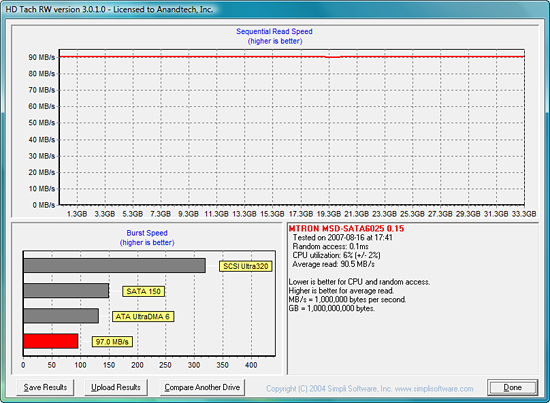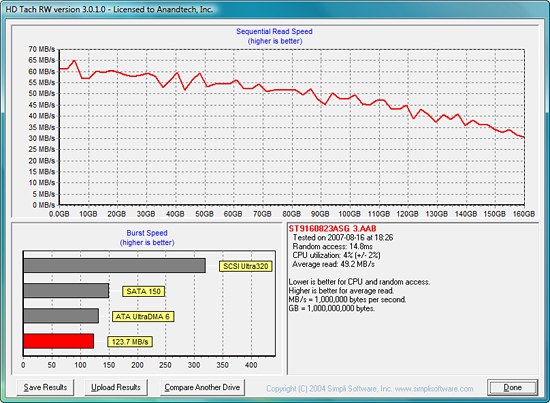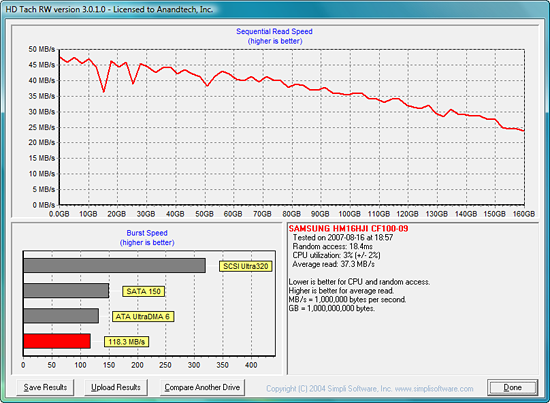HD Tach 3.0 Performance
MTRON 32GB SSD
Seagate Momentus 7200.2 160GB
Samsung MH80 FlashON 160GB
Our first screenshot is the MTRON drive and indicates a sustained transfer rate of 90.5 MB/sec with a burst rate of 97 MB/sec and a outstanding access time of 0.1ms or lower. The same drive on a Intel T7100 (1.8GHz) PM965/ICH8 platform scores a sustained transfer rate of 79.3 MB/sec with a burst rate of 82.5 MB/sec. The Intel controller is up to 14% slower with the MTRON SSD drive in this particular benchmark and follows the same pattern as the Intel desktop chipsets.
Our Seagate drive features sustained transfer rate of 49.2 MB/sec, burst rate of 123.7 MB/sec, and random access speed of 14.8ms. With a slower 5400rpm spindle speed, the Samsung drive provides a sustained transfer rate of 37.3 MB/sec, burst rate of 118.3 MB/sec, and random access speed of 18.4ms. While these numbers are significantly lower than the MTRON SSD, the performance differential in actual application benchmarks will be tempered somewhat by the platform components.
MTRON 32GB SSD
 |
| Click to enlarge |
Seagate Momentus 7200.2 160GB
 |
| Click to enlarge |
Samsung MH80 FlashON 160GB
 |
| Click to enlarge |
Our first screenshot is the MTRON drive and indicates a sustained transfer rate of 90.5 MB/sec with a burst rate of 97 MB/sec and a outstanding access time of 0.1ms or lower. The same drive on a Intel T7100 (1.8GHz) PM965/ICH8 platform scores a sustained transfer rate of 79.3 MB/sec with a burst rate of 82.5 MB/sec. The Intel controller is up to 14% slower with the MTRON SSD drive in this particular benchmark and follows the same pattern as the Intel desktop chipsets.
Our Seagate drive features sustained transfer rate of 49.2 MB/sec, burst rate of 123.7 MB/sec, and random access speed of 14.8ms. With a slower 5400rpm spindle speed, the Samsung drive provides a sustained transfer rate of 37.3 MB/sec, burst rate of 118.3 MB/sec, and random access speed of 18.4ms. While these numbers are significantly lower than the MTRON SSD, the performance differential in actual application benchmarks will be tempered somewhat by the platform components.










25 Comments
View All Comments
John Kotches - Thursday, December 6, 2007 - link
It is quite misleading to show the theoretical limitations of other interfaces against the actual performance of a drive.If this were thorough, it would show drives of each interface type against its theoretical maximum.
Dataland - Wednesday, November 21, 2007 - link
(Pingback) Many computer users know that their computer's data is stored on a mechanical hard drive. What many people don’t realize is just how old ...http://dataland.wordpress.com/2007/11/21/the-futur...">http://dataland.wordpress.com/2007/11/21/the-futur...
genotypewriter - Wednesday, September 19, 2007 - link
(1)In your File Compression Performance test, you claim that the "Samsung drive thrives on small sequential data blocks"... ok, why? Because of its on-board flash memory? Then why should the Mtron, which is made up entirely of flash memory, not be faster than the Samsung?
If you look at the HDTach results, you'll see the CPU utilisation being 6%,4% and 3% respectively for the Mtron, Seagate and the Samsung. Although "File Compression" has the word "file" in it, it's a computationally-intensive task before being an IO-heavy task. If it was primarily an IO-based task then there's no reason why the Mtron setup shouldn't be the first. If it was only CPU based then the Seagate should come before the Mtron, but it didn't. It would make a lot more sense to say that the Samsung is faster here because of its low CPU usage in combination with its on-board flash.
It seems like you're using existing benchmark programs without thinking exactly how they relate to what's being tested. You may say this article is an intial test" or "quick and dirty" or something similar but you still make some wrong conclusions.
(2)
You go on to make more unjustifiable claims in favour of Samsung at the end of the File Copy Performance test saying "we find it hard to fault the Samsung drive considering most portable users will be using applications that usually generate small sequential or out-of order data blocks. These type of read or write patterns is something the Samsung drive excels at in initial testing."... So where are the test results that show this? You were surely not pointing at the Photoshop (workstation *cough*) test right where the Samsung was about 1% (wow!) faster than the Seagate, right? And at the point you made these comments you hadn't even gone in to the OS speed tests... and even if you did, how can you keep to your claim when the Samsung is much faster than the Seagate when entering/exiting OS hybernation mode that writes/reads the entire (yes, SuperFetch'ed) 4GB of RAM on your test laptop to disk, sequentially? Shouldn't the Seagate be faster than the Samsung here, if your claims are true?
(3)
And why on earth did you use a laptop with 4GB RAM to test hard drive performance? Wouldn't you have been able to learn a lot more if it was a 512MB/1GB laptop? Yes, there are laptops still out there that come with 1GB or less RAM... especially the ones that are more portable. These happen to be the same laptops that can benefit from the low weight and low power consumption of a SSD.
(4)
Also, why not give times for Windows start up/shutdown? Also, where's the Samsung SSD? Or is that for another half-baked article?
Please use some quality control on your articles because this one is not any more useful than the typical ones that appear on C|*ET.
goku - Tuesday, August 21, 2007 - link
In the mean time, people can get CF to mini IDE adapters to put into their laptops, allowing solid state storage for a fraction of the price of these SSD drives, though the speed in which the data is read is dependent on the adapter's speed and the CF card's speed.araczynski - Sunday, August 19, 2007 - link
hardly impressive for the price, i suppose if you're rich and bored...finbarqs - Sunday, August 19, 2007 - link
is this different than RAM drives? Meaning that this does NOT need a backup battery or power adapter to keep it charged so it doesn't loose it's memory?Spoelie - Sunday, August 19, 2007 - link
Yes8steve8 - Saturday, August 18, 2007 - link
the toshiba r500 is soon shipping witha 64GB sata ssd (i believe a sandisk unit)its $3000 fully configured with 2gb ram/ dvdrw 1.06 Ultra low voltage core 2 duo... led 12.1" widescreen etc etc... very small very light...
if this is $1500 for 32GB..why is a 64GB drive only carrying a $500 premium in these R500's... is there a big difference in performance? 32gb is really too small...
could you plaese review this notebook specifically... the R500.. it seems very very cool.
AnnihilatorX - Saturday, August 18, 2007 - link
MTRON SSD has a premium price of $1499 for 32GBWhile SanDisk 32GB has a price of $500
I think SanDisk 64GB is around $1000 still cheaper than MTRON 32GB
The difference between them is MTRON is the fastest SSD in the world. Sandisk's transfer rate is around
50MB/s
brundlefly - Sunday, August 19, 2007 - link
More importantly, the mtron surpasses all mechanicals while the Samsung does not.Not all SSDs are created equal.